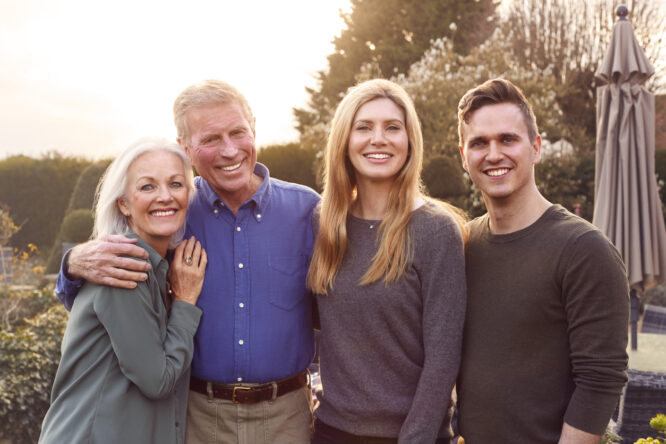Once your kids are adults, your role changes in big ways, but the need to stay connected doesn’t go away.

If anything, the relationship becomes even more delicate. Respect becomes the bridge. Not control, not advice, not guilt—just genuine, mutual respect. When parents treat their grown kids like capable, thoughtful humans (not oversized children), the whole dynamic changes for the better. Here are the things that quietly build that feeling of being truly respected as an adult.
1. Letting them make their own life decisions without inserting your opinion every time

Even if you disagree or would’ve chosen differently, holding back on unsolicited advice goes a long way. Adult children feel respected when their choices aren’t constantly second-guessed or redirected. It shows that you trust their judgement and believe they can handle their own path, even if it looks nothing like yours. That kind of trust is more powerful than any approval.
2. Asking before giving feedback and advice, even the “helpful” kind.

Jumping in with “You should…” or “Here’s what I’d do” often makes adult kids feel talked down to, not supported. The simple act of asking, “Do you want my thoughts on this?” changes everything. It gives them the space to decide how involved they want you to be. And when they say yes, they’re much more open to hearing you because they were treated like equals, not projects.
3. Respecting their home like you would any guest’s

It’s easy to slip into old habits—opening cupboards, commenting on decor, rearranging things without asking. But when parents treat their adult child’s home with the same courtesy they’d offer anyone else’s, it really stands out. It says, “This is your space. I’m a guest here.” That subtle shift reinforces boundaries in a way that feels kind, not distant. It builds mutual respect without needing to say a word.
4. Not using the “I changed your nappies” card to override boundaries

Yes, you raised them. Yes, you’ve seen them at their most vulnerable. However, using that history to ignore or override current boundaries makes grown kids feel like they’ll never really be seen as adults. Respect means treating them according to who they are now—not just who they were at five. The past matters, but it shouldn’t be used as leverage to avoid change in the present.
5. Genuinely listening without jumping in to fix

Sometimes they just want to talk something out. When parents can resist the urge to fix it right away and instead say things like, “That sounds tough” or “I hear you,” it creates a deeper bond. Being heard without interruption or correction is validating. It says, “I trust you to figure this out—I’m just here to walk with you through it.” That’s a huge mark of respect.
6. Admitting when you were wrong, especially about the past

There’s something healing about a parent saying, “I didn’t get that right back then,” or “I see now that wasn’t fair.” It tells your adult child that you’re still growing too, and that they’re allowed to have their version of the story. It doesn’t weaken your role. If anything, it strengthens trust. Owning your missteps models the kind of reflection and humility that helps adult relationships thrive.
7. Letting their identity be what they say it is

Whether it’s how they describe their personality, relationships, mental health, gender, or career—respecting it without trying to reshape it is huge. You don’t have to fully understand everything to honour it. Believing them when they tell you who they are is one of the clearest ways to show you value their truth. It tells them you’re still in their corner, even if their life looks unfamiliar to you.
8. Supporting their parenting style (even if it’s different from yours)

When adult children become parents, the dynamic shifts again. Respect means resisting the urge to criticise how they do things or insert your own “back in my day” commentary unless asked. Even relaxed support—like saying, “You’re doing a great job” or asking what they need—can go a long way. It shows that you trust them to raise their kids their way, which builds even more connection across generations.
9. Not guilt-tripping when they say no

Whether it’s turning down a visit, skipping a family event, or setting a limit around time or emotional bandwidth—respecting the no without guilt keeps the relationship strong. It tells them they’re allowed to have boundaries and still be loved. That one shift often determines whether adult kids feel safe to stay close or start pulling away.
10. Being curious about who they are now, not just who they were as a kid

It’s easy to cling to old images, but asking what they’re passionate about now, what they’re learning, what’s been hard lately—that curiosity shows real care. It tells them they’re not just frozen in time as “your child.” They’re someone worth getting to know as a full adult. That kind of interest keeps the relationship alive and growing.
11. Respecting their time as equally valuable to yours

Showing up late, expecting them to drop everything for you, or assuming they’re always available sends a subtle message that their schedule doesn’t matter as much. When you respect their time—by being punctual, asking first, or being flexible—it shows you see them as a full adult with their own commitments. That one shift changes how they experience your presence.
12. Avoiding comparisons to siblings or peers

Even gentle comparisons can sting. “Your brother’s doing this,” or “She already has kids”—it might sound casual, but it chips away at a sense of being respected as an individual on their own timeline. Respect means letting each child be their own person, not a version of someone else. It builds confidence and reinforces that your love doesn’t come with a scoreboard.
13. Showing appreciation for what they do, not just what they achieve

It’s easy to celebrate big milestones. But saying thank you for the day-to-day things—checking in, showing up, caring for other people—often means more. It reminds them that they’re seen for how they move through the world, not just what they accomplish. That kind of recognition builds mutual respect and connection in everyday life.
14. Giving them space to disagree with you without it becoming a battle

Healthy adult relationships include disagreement. When a parent can handle being disagreed with without escalating, dismissing, or pulling rank, it creates emotional safety. It shows your child they can be honest without risking the relationship. That’s what turns conflict into growth instead of distance, and it starts with mutual respect.
15. Saying “I’m proud of you” in a way that’s about who they are, not just what they do

Being proud of someone for a promotion or a new house is lovely, but telling them you’re proud of how they handled a hard situation or treated someone kindly hits different. When parents name the core parts of who their adult children are—resilience, kindness, thoughtfulness—it makes them feel truly seen. That kind of respect leaves a lasting imprint.




